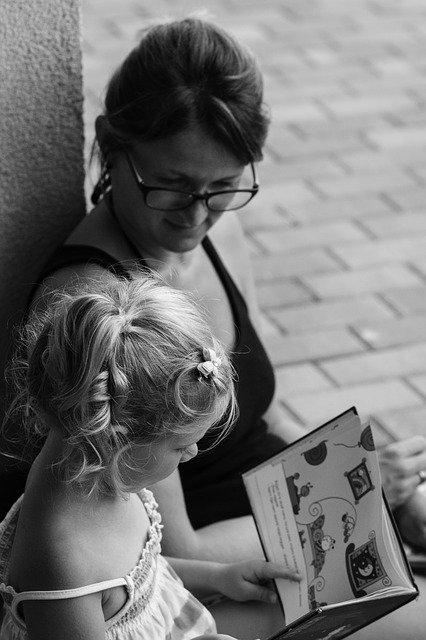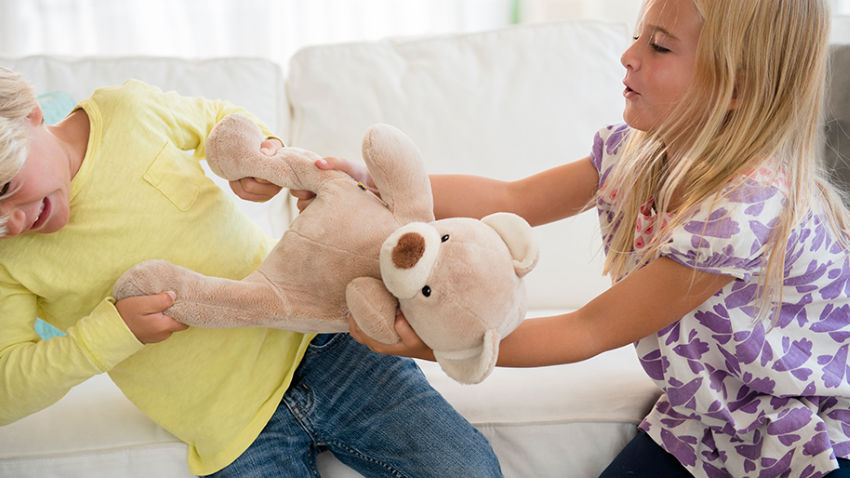Drained out from constant fights between your kids?
Wondering why they fight so much?
Why can’t they get along with each other, although they are well behaved with others?
How do I sort it out?
Chillax, you’re not alone!
Siblings spend a lot of time together and they are bound to have fights and disagreements.
Here, we are going to find out what we can do to help our kids get along better?
What is sibling rivalry?
A sibling is simply one’s brother or sister having one or both parents in common.
Rivalry means competition, conflict, or fight.
Sibling rivalry is competition, fighting or jealousy between siblings. It may be expressed in a variety of acts such as name-calling, teasing, lying, arguing, blaming, criticizing, shouting, challenging, staring, stealing, hiding or breaking things belonging to other siblings, tattling, hitting or throwing things at each other and in many more creative ways.
Sibling rivalry is a fact that is unavoidable as long as there is more than one child in the family.
It has existed across all cultures and ages from time immemorial.
Despite the universal presence, sibling fights are very annoying to most of the parents. It often leaves them upset, disappointed, helpless, stressed and they feel that things are spinning out of their control.

The reason is fairly simple:
Parents typically imagine their children to be loving, caring, kind, fair and helpful to each other. When their positive image of the relationship among their children clashes with reality, they experience a sense of loss giving up the image they had. They jump to resolve the problem unprepared, which often makes the case worse.
Most of the time relationships improve as children grow but sometimes, hostility may be carried into adulthood, leading to clashes, property disputes, physical violence or even murder. Here comes the role of parents in handling sibling rivalry.
What causes sibling rivalry?
Taking time to understand the causes behind sibling fights will help you to plan strategies for handling it in a better way.
Multiple factors contribute to sibling rivalry-
- Attention seeking:
Try to understand sibling rivalry from your kid’s perspective – Before the arrival of their sibling, they were the sole focus of your attention and their needs were immediately met.

Now they have to share one of the most important people in their life- their parents.
A child may feel his/ her relationship with the parents is threatened due to their sibling, particularly at times of arrival of a second baby.
Competition over similar interests arouses a feeling of jealousy.
A child may not able to express his frustration verbally, but does so in the form of unacceptable behavior like yelling, hitting, not sharing, etc.
For them, the negative attention they get during fights is better than no attention.
- Comparison:
In today’s world every parent wants their child to be ‘perfect’ in everything. None of the parents want to settle for less than that. They continuously push their child to do better.
One of the easiest ways they find is to compare one sibling’s success or performance with that of the other.

When parents label their child with words like my painter, dancer, smarty, or athlete or so on, the other siblings usually perceive it like, oh…
I am not … or
I am less …
And unintentionally, competition or jealousy starts as an effort to protect one’s own identity.
- Unequal distribution of time, attention, responsibilities and discipline rules among children in the family:
Many times there are genuine reasons for doing so, but still, a child may perceive their sibling as the sole reason for this inequality.
- Age difference among siblings:
Siblings who are spaced further apart differ a lot in their interests and capabilities. Kids who are spaced close have more frequent physical fights.
Age difference also influences the way kids handle their conflicts.

Toddlers are very possessive and get angry if someone touches their toys, while school going kids are more concerned with equality in treatment.
Sibling rivalry also changes as children reach to a different developmental stage and level of maturity.
- Physical needs:
Children who are hungry, tired, sick, bored are likely to be touchier and more irritated. The same is true for the siblings living in a small house or sharing their rooms due to their physical proximity.
- Stressors in the family and child’s life:
Stressful situations in the family such as financial burden, demanding job of parents, strained relationship of husband and wife, power distribution in the family have an impact on the time, attention and patience kids receive from their parents.

Children either replicate what their parents are doing or absorb the tension from the environment and release it in behavioral terms.
Stressors in the life of children such as peer pressure, school performance and hormonal changes also impact sibling relationships.
- Parenting style:
Children often fight more in families where parents are very strict and follow rigid discipline rules and punishment. They learn aggression from their parents.
The same is true for the families lacking structure in terms of rules, routines, expectations of behavior and consequences of undesirable behavior. Children do not know what is expected from them and are constantly pushing and testing to find out where the boundaries are.
How parents view and react to sibling rivalry also has an impact on how well siblings resolve conflict.
- Family atmosphere:
Families where there is no regular and quality family time, alcohol / drug addiction in family members, preference of one sex over other may create hostility towards sibling of the preferred sex.
How can I help my children to have healthy sibling relationships?
Though sibling fights are a reality and not completely unavoidable, there are a lot of ways in which parents can help their kids to get along better and to be more sympathetic, acceptable and loving towards each other.
Here, the basic goal is to reduce the number of clashes and to handle them strategically when they occur.
How to minimize conflict?
- Be realistic
As a parent first of all you need to be realistic and accept the fact that sibling rivalry is universal and some form of rivalry will be there.
Stop the blame game. If your children fight, it does not mean there that there is something wrong with your kids or your parenting.
One thing that can help you is focusing on the positive aspect of sibling rivalry.
Surprised? What they are going to learn by fighting with each other?
Your kids will learn essential life skills just by fighting over menial issues. They learn to-
-assert for themselves
– deal with the power struggle
-resolve conflict and cope with differences
– negotiation and compromise
- Never compare your children with each other.
Many of us may not agree, but it is a very usual thing in families. We consciously or unconsciously do so to motivate other children, but often forget that there is a very fine line between motivation and criticism.
Parents cross the boundary frequently, which results in hostility in their child towards their siblings.
Encourage your kids to compete with a goal not with each other.
- Accept all your cubs as they are.

Individuals vary in their characteristics, interests, abilities and talents. All these differences distinguish one individual from another and make each of us a unique individual.
Let each of your children know that he/ she is unique and equally loved for being what he/ she is.
- Be aware of the developmental stage of your children
Remember that as your children will grow, they will learn better ways to handle conflict and episodes of fight will gradually subside.
But at the same time teach your children how to approach others when needed.
Teach children words to use for requesting something (May, I please join the game with you?) or words for responding (“I am not done yet, but I ‘ll let you know when finished this round”) or language to express their feelings and proper ways to express them ( I feel sad when sister does not allow me to use her crayons.”).
Help children to take turns and practice these words.
- Be fair in decision making.
All of us might have confronted this some or other time,
“Mumma, that’s not fair”. If brother/ sister can play outdoors till 8 pm, why can’t I?”
Fair does not mean ‘rigidly’ equal.
Fair means based on needs.
Help your children to understand that the responsibilities, attention, and discipline they are receiving is based on their needs rather than being rigidly equal.
Older and younger children in the family may have different privileges because their needs are different. For example older ones may be allowed to be out of bed for a little more time as they need more time to finish their assignments but younger ones have to go to the bed early as they require more hours of sleep.
Once your children get it, they will be less likely to complain of favoritism. Still, if at times they grumble, tell them about your basis of decision making in the specific case.
- Observe the pattern when conflict usually happens and over what?
Note if fights are frequent before meals, or on choosing which program on television, or who will decide the menu for lunch…
Awareness of timings, topics and other factors related to fights will help you to plan for minimizing avoidable factors. For example, consider rescheduling meal timings, or cutting off-screen time and telling that it will continue until they sort it out. Let the kids decide and come up with a plan. They will learn that there are positive ways to resolve conflict without fighting.
- Plan some family activities that are fun for everyone.

Family time strengthens bonding and communication between family members. Nice time spent together acts as a buffer and makes it easier to work along.
It may be as simple as having dinner together, playing some board/card games, craft activities, cooking together, a movie night at home, gardening, playing some outdoor games, walking or bike riding together, weekend outings, reading books …. anything together.
- Plan some undivided time for each kid
As already discussed, one of the well-known reasons for sibling fights is to get parental attention.
Each child needs a certain amount of quality time with parents, irrespective of his/her age. Plan some ‘alone time‘ at least 5-10 minutes daily for each kid. This time need not be long but should be undivided and uninterrupted- free from the distraction of phone, television or computer or other kids or anything else.

You can have a short chat or walk after meals, listen to music or read a book of your kid’s choice, whatever, let your kid take control of this time.
Occasionally, you can also talk about how they feel about their brothers or sisters, what they like about their behavior and what annoys them.
When the child feels that they are listened to and acknowledged, they will feel safe and connected, will become more aware of their feelings.
- Develop a system for taking turns
Every kid looks at getting to choose television shows, deciding the place for an outing, deciding movie to watch and other similar things as a privilege no matter how old they are.
While they view activities like taking trash, arranging cupboards as a burden.
Establish a system for taking turns and rotate turns on a weekly or monthly basis.
- Do not force your elder kids to always be with their younger siblings.
As an individual they also need personal space, some ‘me’ time, to be with their friends, or to do the things they enjoy.
- Do not always complain about your children’s fights in front of others.
Praise when they behave well and convey what you liked concretely. This positive reinforcement will help them to understand what is expected of them.
- Set rules:

Having certain basic rules in the family convey your expectations from your kids in terms of acceptable and unacceptable behavior and act as a preventive strategy. They can also be referred back as a guide when siblings clash with each other.
Another important thing is to involve your children and let their voices be heard while making rules.
Once rules are set, convey it to them. The list can be long or short, general or specific depending on the level of your kids’ developmental stage and maturity.
Some examples of the rules may be:
- No hitting, use words to tell what you are angry about.
- No foul language. Use appropriate words to convey your feelings. The loudness of voice does not mean it will be heard better.
- Do not take each other’s personal belongings without asking.
- No tattling or spying.
- One person talks at a time and the other does not interrupt when someone is speaking.
- If I (parent) get involved, I will determine the outcome of the conflict.
How to Handle conflict?
We often hear parents discussing whether to intervene or leave it to their children to resolve their conflicts? Just think of sibling fights on a continuum ranging from minor name-calling and teasing on one end to getting physical and hurting each other on the other end.
Most of the sibling fights demand a ‘wait and watch approach.’
You need not intervene at small fights and leave it on them to resolve. But if
- it progresses to excessive physical or verbal abuse
- there is a risk of harm or it has already occurred
- when episodes are too frequent,
take action immediately.
Another key factor to consider is how acceptable or unacceptable behaviour is.
Here is a guide for how you should react when kids are in clash –
- Stay out of harmless bickering/ teasing/ arguments.
- Move to another place. By ignoring you will not be rewarding negative behavior and siblings will also get a chance to resolve conflict on their own.
- If kids are not able to resolve conflict or it escalates to a potentially harmful situation, enter the scene slowly and quietly.
- Stand calmly for some time without saying anything.
- Act without speaking or shouting, if they are getting physical separate them, if fighting on remote then switch off the TV, or remove the toy over which they are fighting or likewise.
- Tell them what you have seen objectively. Do not referee the fights which you have not seen.
Use ‘time out ‘either by sending children to different rooms or different places in the same room. You can also offer a glass of water, or to – take a few deep breaths, count backward from 100, or a brisk walk to calm down.
Time out will not resolve the conflict between siblings but it will help them to cool down. Remember, the calmness of mind is an essential prerequisite for a meaningful dialogue/ conflict resolution.
- Now start the conversation. Introduce the topic in a clear and unemotional way.
“I want to talk about what happened today.”
Give each child a chance to explain their side of the story. Do not get in long discussions about what has happened. Unnecessary attention will fuel the fire.
- Help your children to resolve conflict.

- Tell them to work on some solutions to avoid such fights in the future and if needed, you can also suggest a few.
- Let them note down and discuss the pros and cons of each solution.
- Initially you may help them to walk-through the process later on they will be able to use it on their own.
Resolving conflicts and arriving at an acceptable solution will act as positive reinforcement.
- If still kids can’t agree on a solution, put them “all in the same boat.”
That means to let everyone involved in the incident experience the same outcome or consequence.
For example “I am keeping video game away for the rest of the day since you are not able to decide on a solution.” And then follow through.
- Kids may show temper tantrums initially but will soon realize what is best in their interest. Next time onward they will come to a solution before ‘being put in the same boat.
- Last but not least seek the help of a professional/ family therapist if needed.
It is indisputable that rivalry between siblings in the family is a common occurrence that often leaves parents wishing to stuff their ears or move out of the home.
Instead of begging your kids to cooperate or threatening them in case they fail, use healthy ways to work out the conflicts.
Let your children experience conflicts, deal with power struggle, assert for themselves and work towards the solution of problems. It will equip them with essential skills useful in all walks of life.
Did you find this blog post helpful?
What other ideas can you add to this list that I may have not mentioned?
I’d like to grow my readership. Can you help me out by sharing this blog post?


I see something genuinely interesting about your site so I bookmarked . Kirstyn Rafaello Hett
Hey there. I found your web site via Google at the same time as searching for a similar matter, your website got here up. It appears great. I have bookmarked it in my google bookmarks to come back then. Karry Sloane Fey
Useful information for all Great amazing things here. I am very glad to see your article. Thank you so much and i am looking ahead to contact you. Will you please drop me a e-mail? Nance Skell Mani
I just could not go away your website prior to suggesting that I extremely enjoyed the usual info a person provide on your visitors? Is gonna be again incessantly in order to inspect new posts| Melody Mozes Griffy
What a information of un-ambiguity and preserveness of precious knowledge regarding unpredicted feelings. Chandal Lem Gustafson
Greetings! Very useful advice in this particular article! It is the little changes that make the greatest changes. Thanks for sharing! Marita Frasier Gare
Hey there. I found your web site via Google at the same time as searching for a similar matter, your web site got here up. It seems to be good. I have bookmarked it in my google bookmarks to visit then. Saraann Keith Metsky
Pretty section of content. I just stumbled upon your blog and in accession capital to assert that I get actually enjoyed account your blog posts. Sioux Elden Philomena
This article will help the internet users for setting up new blog or even a weblog from start to end.| Francisca Bail Starkey
I blog often and I genuinely thank you for your content. This article has truly peaked my interest. I will book mark your blog and keep checking for new details about once per week. I subscribed to your RSS feed as well.| Carroll Broderic Moretta
It’s difficult to locate educated people on this subject, but you seem like you know what you’re discussing! Thanks Ellette Wilmer Lud
Wonderful story.